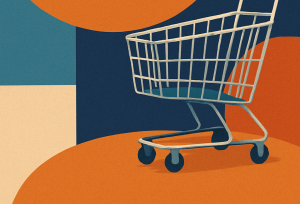
Share
By Alex Cramer
As the great philosopher Biggie once said “Mo’ money, mo’ problems,” or in other words, sometimes the solutions to your problems can also be their causes.
That’s why when we consider the good news, that between 2021 and 2025, the global e-commerce industry is expected to grow to $11 trillion, we also have to consider that as the market grows stronger, so does the competition.
A study by Shopify estimates that there are approximately 12 to 24 million e-commerce businesses worldwide and that number is only expected to grow larger as more customers shop online.
And while you don’t need to fear competition, you should be prepared for the impact it will have on your business, including increased customer acquisition costs, as more brands try to buy the same amount of premium ad inventory.
That’s why it’s important to remember that it costs less to keep an existing customer than it does to get a new one, which means that establishing a strong sense of brand loyalty is an extremely cost-effective move.
One of the best ways to create that loyalty is to foster and build a community around your brand, where fans of your product can interact not just with your business but also with each other.
These are some of the most important steps you can take if you want to build a community around your brand.
Gate Your Community
This may initially feel counter-intuitive, after all, all you want as many people to interact your brand as possible, but by creating a sense of exclusivity around your community means that those who aren’t a part of it will feel like they’re missing out on something important and those who are will think they belong to something exclusive.
The price of admission can be as simple as giving an email, creating an account, or making a single purchase but creating some kind of barrier to entry, even a small one, allows you to create a feeling in your customers that by not being a part of your community they may be missing out on something special.
NFT
An NFT is a way for you to offer your most loyal customers something unique and exclusive that comes directly from your brand. You can sell your NFTs directly or offer them as rewards for completing certain tasks, like posting about your brand on their social media channels.
You also want to attach value to your NFTs that goes beyond whatever cash value they probably don’t even have.
For example, owning an NFT could mean that your customers would be allowed into exclusive forums, have early access to sales or you could send them unique discount codes. You can also allow them to represent their NFT as a badge on your social channels or messaging forums as a way to give them a sense of status within your community.
Define Your Values and be Intentional with Your Culture
At Advertise Purple, we like to have nights out as a company, whether that means going to Dodger games or a bowling alley. These events don’t directly translate to greater sales or productivity, but they are how we intentionally build a culture within our company so that people can feel like working here means being more than their job description.
Likewise, to create a successful community for your customers, you have to intentionally build a culture and traditions around your brand that they can be a part of.
For example, you could declare the day your company was founded to be a holiday, and offer prizes for customers who send in the best pictures or videos of themselves using your product.
However you do it, you need to find ways that your buyers can participate in being a part of your brand, beyond just buying a product.
—
When you launched your business, creating a thriving community around your brand probably wasn’t your first or even your tenth priority. But while you can always buy ads, you can’t buy loyalty, and ultimately while a slick commercial or IG ad can push a customer to your website, it’s the sense of belonging and culture that you create that will keep them coming back for more.



